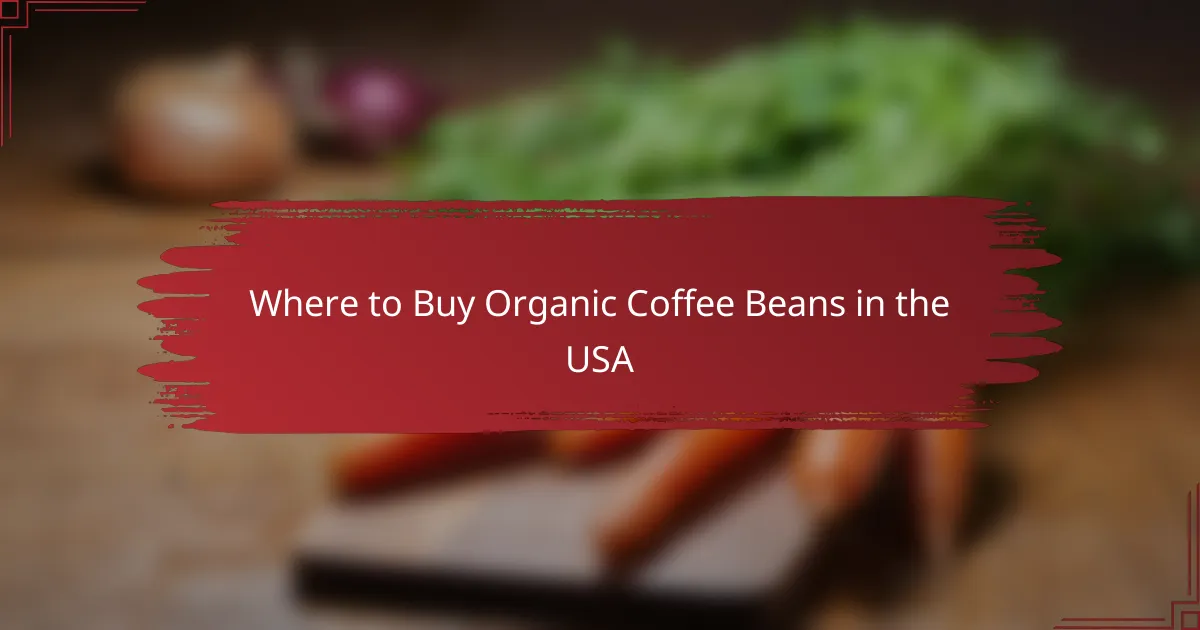Organic coffee beans are sourced from various outlets in the USA, such as online retailers, local farmers markets, and specialty coffee shops, each providing unique advantages for consumers. These beans not only offer health benefits and a distinct flavor profile but also promote environmental sustainability by avoiding synthetic pesticides and fertilizers. To ensure quality and ethical practices, look for certifications like USDA Organic, Fair Trade, and Rainforest Alliance, which highlight different aspects of responsible coffee production.

Where to Buy Organic Coffee Beans in the USA
Organic coffee beans can be purchased from various sources in the USA, including online retailers, local farmers markets, and specialty coffee shops. Each option offers unique benefits and considerations for consumers looking for high-quality organic coffee.
Online Retailers
Online retailers provide a convenient way to access a wide variety of organic coffee beans from different regions. Popular platforms like Amazon, Thrive Market, and specialty coffee websites often feature detailed descriptions and customer reviews to help you choose the right product.
When shopping online, consider factors such as shipping costs, delivery times, and the retailer’s return policy. Look for options that offer free shipping on orders over a certain amount to maximize value.
Local Farmers Markets
Local farmers markets are excellent places to find fresh organic coffee beans directly from producers. These markets often feature local roasters who can provide insights into their sourcing practices and the flavor profiles of their beans.
Visiting farmers markets allows you to support local businesses and often taste samples before purchasing. Check the market schedule in your area to find out when and where they take place.
Specialty Coffee Shops
Specialty coffee shops typically offer a curated selection of organic coffee beans, often sourced from specific farms or regions. These shops usually prioritize quality and can provide detailed information about the beans’ origins and brewing methods.
When visiting a specialty shop, don’t hesitate to ask the barista for recommendations based on your taste preferences. Many shops also sell beans in small quantities, allowing you to experiment without committing to larger bags.

What are the Benefits of Organic Coffee Beans?
Organic coffee beans offer numerous advantages, including health benefits, a positive environmental impact, and a distinct flavor profile. These benefits stem from the absence of synthetic pesticides and fertilizers, which enhances both the quality of the coffee and the sustainability of its production.
Health Benefits
Organic coffee beans are often considered healthier due to their lower levels of harmful chemicals. Studies suggest that they may contain higher concentrations of antioxidants, which can help combat oxidative stress in the body.
Additionally, many consumers report fewer side effects, such as jitters or digestive issues, when drinking organic coffee. This is likely due to the absence of synthetic additives and the use of natural farming practices.
Environmental Impact
The cultivation of organic coffee beans promotes biodiversity and soil health. Organic farming practices avoid synthetic fertilizers and pesticides, which can harm local ecosystems and water sources.
Moreover, organic coffee farms often implement sustainable practices such as shade-grown cultivation, which helps preserve habitats for various species. This approach not only benefits the environment but also enhances the quality of the coffee produced.
Flavor Profile
Organic coffee beans typically exhibit a richer and more complex flavor profile compared to their non-organic counterparts. The absence of chemical fertilizers allows the natural flavors of the coffee to shine through, resulting in a more authentic taste experience.
Many coffee enthusiasts appreciate the unique characteristics of organic coffee, which can vary significantly depending on the region and growing conditions. This diversity offers a wide range of flavor notes, from fruity and floral to nutty and chocolatey.

What Certifications Should Organic Coffee Beans Have?
Organic coffee beans should ideally have certifications that ensure they meet specific agricultural and ethical standards. Key certifications include USDA Organic, Fair Trade, and Rainforest Alliance, each focusing on different aspects of sustainability and social responsibility.
USDA Organic Certification
The USDA Organic Certification guarantees that coffee beans are grown without synthetic fertilizers, pesticides, or genetically modified organisms (GMOs). To obtain this certification, farmers must follow strict guidelines for at least three years, ensuring that their practices promote biodiversity and soil health.
When looking for USDA Organic coffee, check for the official seal on packaging. This certification not only supports environmentally friendly farming but also often leads to better quality beans, as organic practices can enhance flavor profiles.
Fair Trade Certification
Fair Trade Certification focuses on equitable trading conditions for farmers, ensuring they receive fair prices for their coffee. This certification promotes sustainable farming practices and social development in coffee-growing communities, often providing additional funds for education and healthcare.
When purchasing Fair Trade coffee, look for the Fair Trade Certified label. This ensures that the farmers are paid a minimum price, which can help protect them from market fluctuations and improve their livelihoods.
Rainforest Alliance Certification
The Rainforest Alliance Certification emphasizes environmental conservation and sustainable farming practices. Coffee producers must adhere to standards that protect ecosystems, conserve water, and promote wildlife habitats while ensuring fair treatment of workers.
To identify Rainforest Alliance Certified coffee, look for the green frog logo on the packaging. This certification not only supports sustainable agriculture but also helps consumers contribute to biodiversity conservation efforts.

How to Identify Quality Organic Coffee Beans?
To identify quality organic coffee beans, look for specific characteristics in their appearance, aroma, and taste. High-quality beans should be uniform in size, free from defects, and exhibit a rich, inviting scent.
Visual Inspection
Start by examining the beans for uniformity in size and color. Quality organic coffee beans should be whole, without cracks or broken pieces, and typically have a consistent shade, whether light or dark roast. Avoid beans that appear dull or have an uneven surface.
Check for any signs of mold or foreign matter, as these can indicate poor handling or storage. A good rule of thumb is to choose beans that are oily but not excessively greasy, as this can affect flavor and freshness.
Aroma Evaluation
The aroma of coffee beans is a crucial indicator of their quality. Fresh organic coffee should have a strong, pleasant scent that reflects its origin and roast level. Take a moment to smell the beans before grinding; a rich, complex aroma suggests high quality.
When evaluating aroma, consider the notes you detect. Quality beans often have floral, fruity, or nutty undertones. If the scent is faint or unpleasant, it may indicate stale or inferior beans.
Taste Testing
Taste testing is the final step in identifying quality organic coffee beans. Brew a small batch using a method that highlights the beans’ characteristics, such as a French press or pour-over. Take note of the flavor profile, including acidity, sweetness, and body.
High-quality organic coffee should have a balanced flavor with distinct notes that reflect its origin. Avoid beans that taste bitter or overly acidic, as these can indicate poor quality or improper roasting. Aim for a smooth finish that leaves a pleasant aftertaste.

What are the Best Organic Coffee Brands?
The best organic coffee brands are known for their commitment to high-quality beans, sustainable sourcing, and ethical practices. Popular choices include Stumptown Coffee Roasters and Blue Bottle Coffee, both of which offer distinct flavors and brewing experiences.
Stumptown Coffee Roasters
Stumptown Coffee Roasters is renowned for its direct trade practices, ensuring farmers receive fair compensation. Their beans are sourced from various regions, including Central and South America, which contributes to a diverse flavor profile.
When selecting Stumptown, consider their popular blends like Hair Bender, which offers a balanced taste with notes of chocolate and citrus. They also provide single-origin options for those looking to explore unique flavors from specific farms.
Blue Bottle Coffee
Blue Bottle Coffee emphasizes freshness, often roasting beans within 48 hours of shipping. They source organic coffee from around the globe, focusing on quality and sustainability in their supply chain.
For those new to Blue Bottle, their New Orleans-style iced coffee is a standout, featuring a rich, sweet flavor profile. Additionally, their subscription service allows customers to receive freshly roasted beans regularly, ensuring a consistent supply of high-quality coffee.



